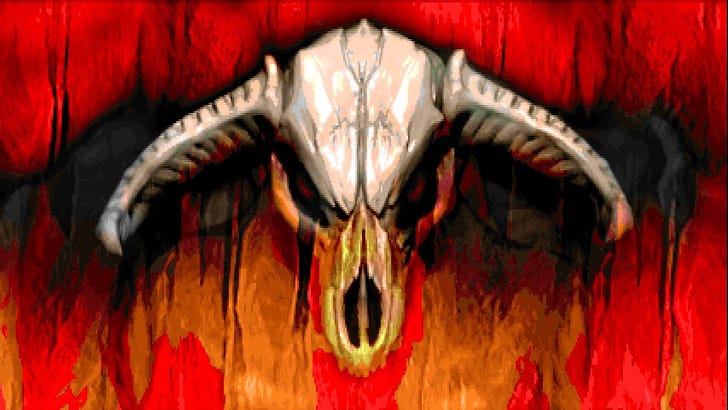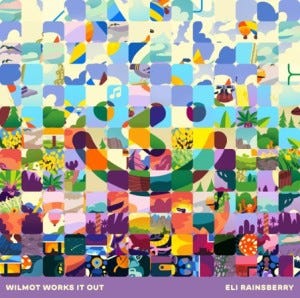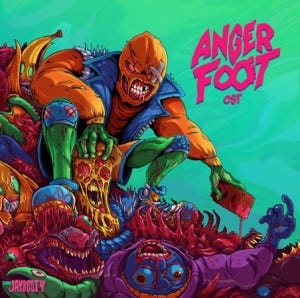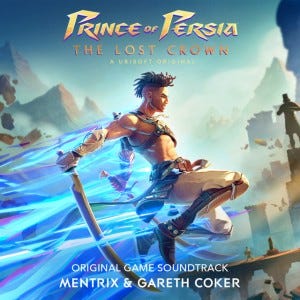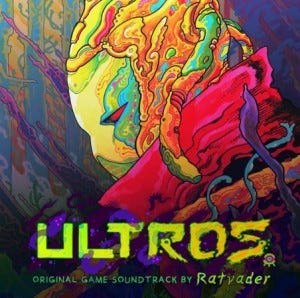While the long tail of the 2023 videogame industry crisis seems to have no end, musical talent and creativity have flourished. Last year’s trend among the bigger (AAA) developers of renovating old musical formulas continued, from Reynatis to Metaphor Refantazio. We directly revisited the music of Final Fantasy, Silent Hill and, while technically new, Stellar Blade ~ an homage to NiER: Automata. But there were also signs of innovation, spearheaded by Ubisoft’s combining both fresh and existing talent across two (!) Prince of Persia OSTs, both featured below. The AAA industry’s definitely still banking on nostalgia, but 2024 could be seen as a welcome inflection point.
The running theme in our lists for the past few years has been how the indie and AA space is where the actual novelty lies, and this year is no exception. Arguably, this space was not as experimental as it was last year, but production values seem noticeably higher. There was more orchestral and ensemble output (New Cycle, The Thaumaturge, Hand in Hand, Neva and so on), a shrinking of the sonic gap between them and the AAA space. This apparent investment in a more listenable sound characterizes most of the releases we’ve covered in 2024, with a distinct lack of the bedroom-quality recordings of recent years.
The wave of eclecticism we identified last year has coalesced; in albums like Arctic Eggs, The Axis Unseen or Nine Sols you can identify the expertise that the current wave of VGM artists have developed around genre mash-ups. While the best VGM has always embraced this (Koji Kondo tracks often mix genres), the level of seamless integration has perhaps never been so high.
Our singular entry in this year’s Retro category is a surprise. After at least a couple of years of our retro barrel being empty, UFO 50 makes the list ahead of other notable releases not quite distinctive enough to make the cut (Crow Country and Witching Stone among them). UFO 50, however, is a classicist’s dream, a return to form so powerful it might just spark something new ~ something not tied to nostalgic reproduction but to imaginative exploration of our shared history.
Two final notes: First, we strive to be extensive but can’t possibly cover everything. We’d love to know which of the smaller soundtracks captivated you this year! Second, if any composers and musicians are reading this, please make your music as accessible as possible for audiences beyond the gaming world! Bandcamp remains our favourite platform, but Spotify and YouTube Music work well. (Even Nintendo’s finally caught up, in a typically Nintendo-like fashion.) Please don’t restrict yourselves to Steam or GOG to sell or stream your work ~ there’s an entire world of music enthusiasts out there ready to listen.
And now, by genre and in alphabetical order, we present the *Press A* best videogame soundtracks of 2024!
Ambient
Eli Rainsberry ~ Wilmot Works it Out
The artist is no stranger to these lists, having been featured regularly with one soundtrack or another across the years. This time around, it’s with the sequel to the work for which we awarded them a spot in our 2019 list, Wilmot’s Warehouse. In Wilmot Works it Out, Rainsberry seems to begin from that same minimalist spirit of process, although this time around there is much less iteration and variations are more playful, introducing a few non-recurring sounds and jazzy structures that move the OST in a less meditative, more melodic direction. There’s a bossa nova undercurrent throughout the album, a brightness that often aligns it with old-school Japanese soundtracks, particularly Koji Kondo’s work, and their free-form adaptations of Latin American music and jazz. It brings out the best in Rainsberry’s subdued compositional style, the quiet development of electronic motifs into cheerful harmonic territory. (David Murrieta Flores)
Line Katcho, Drew Redman, Alex Mah ~ 1000xRESIST
Among the most bountiful of this year’s picks is the 85 tracks comprising the soundtrack to the narrative adventure 1000xRESIST. Although underpinning a sci-fi story of clones, aliens and disease, the soundtrack subverts expectations with a quiet piano introduction and the soft-spoken vocals of Alex Mah, a ‘guest songwriter’ alongside compositional duo Line Katcho and Drew Redman. This softness and almost fragility persists into more electronic waters, as waves of warm synth lap at our feet, until there are hints of our reality starting to unravel. Cycles of amorphous notes start to loop endlessly, a distant wailing emerges like a cry for help (“Year Unknown”); a sudden maelstrom heralds a glitchy, broken voice that repeats endlessly but remains unintelligible (“That Was Only For You To See”); a pounding snare quickens and distorts as we are commanded to “Run!”. Reality and serenity thus abandoned, a journey through time and space awaits ~ one suffused with melancholy as much as beauty, and into which a virus could penetrate at any point. While the majority of this set is conveyed through synths and piano, distinctive voices and tempos cluster around characters, locations and events. Sometimes the shorter average track duration disturbs the flow and seamlessness expected of ambient music, but generally works to the set’s favour given that tonal variety. It then allows for the occasional lengthier tracks to become obelisks, such as the pulsating trance of “A Dull Knife Is No Knife At All” and the ominous cosmic dirge of “The Occupants”. Borne of the COVID pandemic, 1000xRESIST is at times assailed by unseen threats of seemingly unimaginable scale, but like all good sci-fi is ultimately most concerned with matters of the individual heart. (Chris Redfearn-Murray)
Electronic
Jaybooty ~ Anger Foot
A relentless electronic soundtrack for a relentlessly violent game, Anger Foot mobilizes techno to draw you into an affective trance in which all that matters is your body (vicariously) engaged in full dynamism. Given that Jaybooty is South African, and although the music is different in rhythmic terms, it’s impossible not to think of new south and east African electronic innovations such as singeli, a festively kinetic celebration of the self in movement, and which perhaps forms the background of this soundtrack’s approach to the clear-cut bang-bang-bang of synths. Unlike the often deeply alienated crunch of techno sound mixes, Anger Foot’s electronics are transparent, almost instrument-like, much closer to the straightforward aural interactions of some progressive kuduro tracks (think DJ Znobia). This is electro grinding at its best, its vital powering of violent themes a throwback to the only other game in recent history that’s perhaps achieved such synergy, Hotline Miami. Go straight. (DMF)
Xaser Acheron ~ DOOM: Legacy of Rust
There have been various DOOM soundtracks over the years, which have – since 2016 at least – prioritized the electric realization of the original’s approach to heavy metal and thrash. But the potential in Bobby Prince’s “outsider” approach to that sort of sound all the way back in 1993 lies in handling those genres as electronic music, producing a unique mesh of brooding ambient and propulsive emulations of rock n’ roll. Xaser Acheron’s OST for the newest episode of the original DOOM leans precisely into that potential, mobilizing all of its aural elements not for electric emulation, but for sheer electronic dynamism. Unconstrained by instruments and the problem of making them sound well together, Legacy of Rust freewheels into one of the most powerful DOOM soundtracks ever, with entire sections that delve into the funky underside of thrash, tracks that swell with synthwave melodies that effortlessly transform into rock riffs, and even some jazzy ballads with a gothic inflection, with solos that could come out of a guitar or a saxophone (it doesn’t really matter). As heir to that unique vein of electronics in VGM, Legacy poses an interesting question: how can a retro soundtrack like this sound so new? Listen, and be driven. (DMF)
Modern Composition
Mentrix, Gareth Coker ~ Prince of Persia: The Lost Crown
‘Tis a sad indictment of the videogame industry that the developers of a game so highly rated with one of the year’s best soundtracks have since been disbanded following commercial underperformance. All the more reason to celebrate the achievements of Mentrix and Coker, the latter of whom is most renowed for Ori but appeared on our pages for his Mario + Rabbids contributions in 2022 (apparently the very soundtrack that won him this gig, with the same publisher). With fittingly Tehran-born multi-instrumentlist Mentrix as co-composer, The Lost Crown blends propulsive, rhythmic tonalities of modernist Eastern folk with melodious Western neoclassicalism. And while the lines each composer draws around their contributions are discernable, their juxtaposition is handled gracefully, the sequencing allowing for swells and lulls in mood and dynamics. Of course, it starts with bombast ~ an opening theme that acts as an overture for the genres and emotions ahead, before we in time submerge into more evocative waters. “Wandering in the Palace” is full of quiet then skittering tension, while a wonderfully off-kilter rhythmic refrain makes for an interesting motif underpinning a few tracks (“The Old Citadel”, “Frozen as it Falls”). Mentrix makes effective use of traditional Persian instruments such as the tar and ney but, like the game designers, is not afraid to yank history into modernity by adding synths, beats and even crunchy guitar lines (see the almost djent-like “The Imprisoned God” and the proggier “The Darkest of Souls”). There is a lot of music here, such that the set perhaps doesn’t demand a complete playthrough, but The Lost Crown is compelling nonetheless ~ stirring and haunting in equal measure. (CRM)
Piotr Musiał ~ Frostpunk 2
The first Frostpunk OST was a success at building up an ironic romantic overcoming of natural forces, its string melodies clashing with ambient arrangements until both were buried by cold silence. Frostpunk 2 doubles down on this dynamic, opting for a much more ponderous tone, with parts of the chamber ensemble attacking their instruments to produce dark, droning sounds, often with percussive qualities vibrant with indetermination. The voices have multiplied, the melodies are even more dramatic, and the overall effect is an intensity rarely experienced in orchestral videogame soundtracks. Musiał’s secret is to use traditional techniques against themselves, in line with the game’s themes of social unrest, a modernist approach that, for instance, undermines the supposed clarity of the strings by twisting it slightly, by letting their sounds grow and expand until they are indistinguishable from ambient noise. Where, given the same tools, other composers look for the cinematic, Musiał looks directly for affect, and that makes Frostpunk 2 one of the best classical soundtracks of the year. (DMF)
Ratvader ~ Ultros
A singular ache for vast expanses, immersed in the soothing quality of nothingness. The Swedish composer had already floored us a few years ago with The Gunk OST, so it is a delight to inform you that expectations were not only met, but surpassed. The chamber arrangements are similar in spirit to Ratvader’s last effort – slow-burning, full of atmospheric drones, expertly reserved when it comes to individual instrumental interventions – but given the psychedelic nature of the game they accompany, the compositions tend towards soundscapes of tension, mutations in an interestingly long duration. At about three hours of length, Ultros exhaustively plays with that sense of subtle anxiety-as-process, the notion of a decomposing and recomposing point of view signaled in the sound-staging: the cello comes forward, then it recedes into the distance; the vocals are made into a drone by means of distortion; an electronic beat lurks softly in the background… In the end, Ultros does feel like an introspective, transformative voyage, one you should embark upon with headphones on, lights out. (DMF)
Rock, Pop & Eclectic
Antynomy ~ Caravan SandWitch
Gracefully swaying between moments of quietude and energetic drive, transitioning across ambient, electronic music, and even folk, this soundtrack evidences that new generations of VGM composers are experts at synthesis. The long arc of videogame soundtracks leads to this moment, in which the genre mixes, variations and appropriations of its early days have coalesced into new forms that seamlessly mutate. As her artist name suggests, the composer deals in opposites, genres that might conflict now aurally materialized by her craft not only into an effective musical flux that does not necessarily feel like a “whole”, but that is also rendered in service of gameplay. It’s rounded out by a sweet song that feels straight out of a M83 album, whose instrumental version narratively concludes the soundtrack. All in all, Caravan SandWitch is a success at articulating an interesting, catchy musical ride with variously disparate elements, an admirable achievement. (DMF)
Marcel Gidote’s Holy Crab ~ Felvidék
Initially exuberant, waxing moody and always surprising, Felvidék ~ an historic term for Upper Hungary, now Slovakia ~ very much leans unsteadily toward the ‘eclectic’ part of our categorical genre mash-up. Unsteadiy because, by all accounts, one of the game’s adventuring duo is an alcoholic ~ a fact that ascribes thematic order to the aural chaos before us. It starts with boisterous psychedelic rock, encasing a jovial motif in synth and brass guises over two tracks, before grinding to a halt with a static-drenched acoustic piece (“Les”) that wouldn’t sound out of place at a Portishead gig. The artist behind all this is 6-piece Czech rock band Marcel’s Gidote’s Holy Crab (a Monty Python-esque name that befits the slapstick humour of the game), who appear to be newcomers to the VGM space if not the music scene broadly. The soundtrack is under an hour but covers multiple genres and moods ~ frenetic jazz-prog, post-rock, lo-fi funk and even a dousing of OG emo (before it went down the toilet), with wailing synth lines and occasional cosmic reverberations that whisk us back to the 70s. Amidst such dynamic swings, the crunchy production and punk-infused delivery make it feel like a set of coherence. And while it undoubtedly makes greater sense behind the retro-inspired surreal landscapes and creatures of the pixelated Hungary, in our real world Marcel succeed in unifying chaos with a retro-styled purpose of their own. (CRM)
Retro
Eirik Suhrke ~ UFO 50
In the same way the game is a sort of counterfactual history of early videogaming, the soundtrack produces an evolutionary fantasy of actual electronic sounds, from mid-80s 8-bit clear-cut simplicity all the way to the more baroquely designed rock n’ roll OSTs of the early 1990s. Suhrke’s reimagination of this period poses interesting creative differences with the chiptune scene and retro composers’ particular obsession with synthwave, mostly found in the artist’s often strict formalism. Where those scenes configure an explicit relation of anachronic contemporaneity to early VGM and tend towards context collapse that reaffirms temporal difference, Suhrke counterfactually plays along, as if that difference did not exist. The result is an amazing collection of short pieces that showcases how imaginative that period was, in reality marked by mimetic attempts to reproduce the sounds of instruments, but in Suhrke’s hands marked, rather, by the endless possibilities of early VGM purely as electronic music. It reminds listeners of the fundamental sound design involved in this work; hopefully we can finally set aside the fact that we’re supposedly listening to a bass, an orchestral string section, or whatever, and truly listen to the keen distortions, the slightly atonal sways, the uncanny high frequencies, the mechanical precision of a sound’s duration… in other words, VGM’s often understated uniqueness in the history of music at large. (DMF)
Honorable Mentions
ASADI ~ The Rogue Prince of Persia
In the same way that Lost Crown plays with Iranian motifs, so does Rogue Prince of Persia, except in a different context: drum n’ bass, dub, 2000’s EDM and trap. It might not be as instrumentally accomplished as the former, but it does a good job of synthesizing sounds so as to produce something special, a soundtrack that still stands out in a field full of EDM. (DMF)
Jack King-Spooner, Talha Kaya, Beth Sbresni, Charlotte Strawbridge ~ Judero
In keeping well with tradition, the soundtrack to Judero is a collection of interpretations of folk songs from the British isles, made by the game’s developer and other artists, to accompany the game’s stop-motion development of stories from the English-Scottish border. The renditions are well-crafted, many of them made with additional instrumentation beyond strings, and an adventurous spirit to match. (DMF)
Shoji Meguro, Atsushi Kitajo, Toshiki Konishi ~ Metaphor: ReFantazio
One of the most bombastic soundtracks we’ve ever heard. At times, it is so overblown and strident that it borders on ridiculousness, and at almost three hours of length it might leave you stunned by the end. This is exactly what makes it so damn entertaining, a listen so fun you might be tempted – beware – to press play on it again. (DMF)

